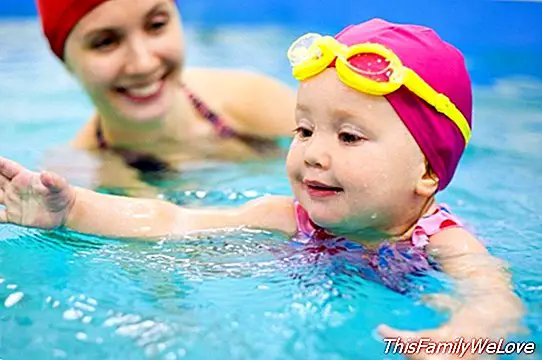Objectives of early swimming for babies

Children who learn to swim in their first months of life are more awake, attentive and independent, concentrate better and grow more. Before the age of 2, children are expected to float so that if they accidentally fall into the water, they do not drown.
Swimming and psychomotor education
Early swimming influences the following aspects of psychomotor education:
· In the organization of the body schema, in the perception and control of one's own body, in the internalization of sensations related to one or another part of the body and to the buoyancy sensation of the same.
· In the basic psychomotor behaviors: in the general equilibrium, in the dynamic coordination and in the oculi-manual coordination.
· In perceptual motor behaviors, in the organization of space and time.
The child has the experience of his own body in the water and experiences new sensations of balance, flotation and propulsion. It is observed that the reflexes come into play. The gesture gains security, becomes more skillful and easy in the field of the game. The activity in the water favors the education of the breathing and a greater motor coordination.
In addition, all the muscles of your body are strengthened in a harmonious way, since swimming is one of the most complete sports.
Finally, during the classes they also use themselves, as it is normal for their mothers not to be present. In this way, the child gets much more effort. On the other hand, in the locker room each child learns to dress alone.
Objectives of early swimming
General:
· Survival
· Early development of psychomotor skills
· Independence of movements
· Introduction to basic skills and abilities
Cognitive:
· Adaptation to the environment
· Discover possibilities of movement in the water
· Differentiation of movements between some abilities and others
Affective:
· That the child establishes positive relationships with the other members of the group
· With the teacher
· Give the baby an emotional environment to enjoy with the activity and the environment
Educational:
· Body awareness in the water
· Proprioceptive sensitivity
· Exteroceptive sensitivity. Relations with the outside
· Vision-apprehension coordination
· Spatio-temporal structuring
· Oculo-manual coordination
· Contribution to the construction of the body outline
· Autonomy and ability to act
· Begin the selection of movements
· Movement in response
Ideas to familiarize the baby with water
· Summer is approaching and if you plan to spend the summer near a place with water, think about the dangers that threaten your little child. Remember that knowing how to swim is a pleasure and not knowing, a danger.
· First of all, accustom your child to water in your own home. It is a simple method to facilitate your later learning.
· Ask friendly families who have taken their younger children to a pool of this type to recommend a good place.
· Before taking your child to a gym you can ask them to let you see how a class develops to verify that it is the best place for him.
· Do not pretend that your son, before 2 years old, learns to swim because he does not have enough strength. However, you can learn to float very well, since your muscles and bones are not developed and do not weigh as much.
· After a "swimming lesson" it is good to shower your child and wash their face at home, because the pools have chlorine and with the effort you sweat.
When you take your child to the gym, it is better that you stay out of class. If you want you can see what they do sometime, but your son will learn more if he has to fend for himself. And something more difficult: If you hear that your son cries inconsolably because he does not want to enter the water, do not go to comfort him. Let the monitor fix it. Otherwise, your child will never learn.
Ignacio Iturbe
Advisor: Marisa Fernández, swimming instructor and coordinator of the pool of the "Almirante" gym in Madrid.




